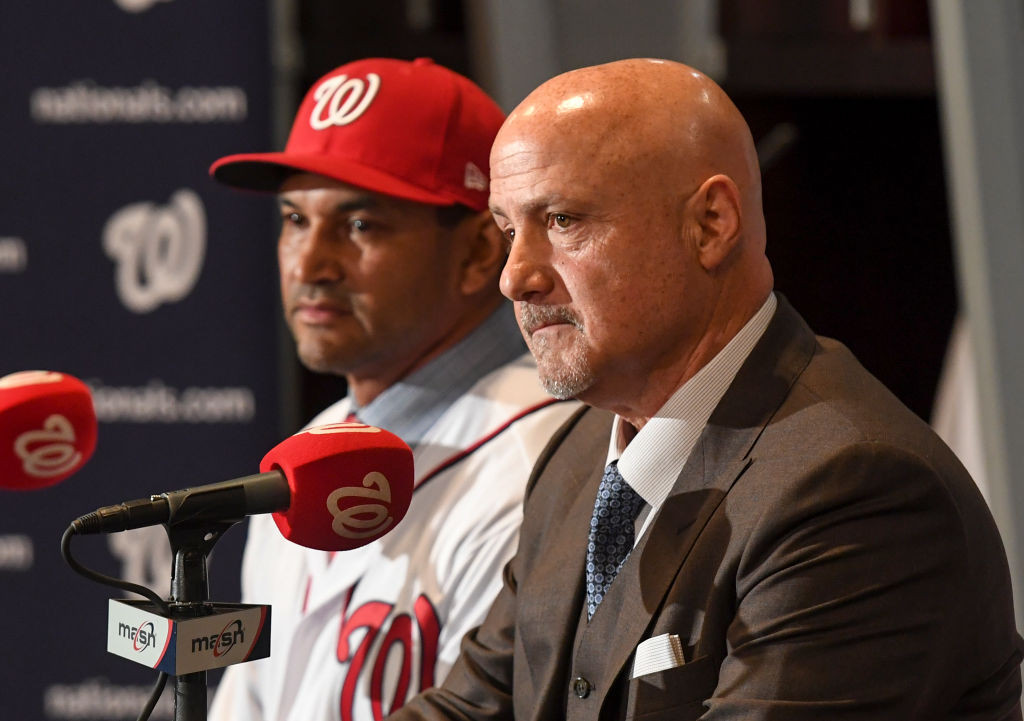Mike Rizzo became the Nationals’ full-time general manager in August 2009. By that point, he had three years of experience with the organization, five months of experience as interim GM. Taking over a franchise in disarray following the mid-spring training resignation of Jim Bowden amid a scandal involving a Dominican prospect who falsified his name and age, Rizzo did plenty during those five months to convince the Lerner family and then-team president Stan Kasten he deserved the job on a permanent basis.
But there was one final task Rizzo needed to accomplish before his superiors were fully convinced: He needed to sign Stephen Strasburg before the Aug. 15 midnight deadline for all of that summer’s draft picks.
Rizzo took negotiations with agent Scott Boras down to the final minute before emerging with a deal: four years, $15.1 million, the most money ever guaranteed a major league draft pick. And in the Nationals Park conference room where he announced that successful deal in the wee hours of the morning – the same room where one year earlier Bowden announced he had not been able to sign 2008 first round pick Aaron Crow – an unsuspecting Rizzo was ambushed by Kasten with a shaving cream pie to the face.
A few days later, Rizzo officially had the GM job he long coveted. One he held for just shy of 16 years, making him one of the longest tenured heads of baseball operations in the industry. Along the way, he built a 103-loss team into a 98-win division champion, made the playoffs five times in eight seasons, won D.C.’s first World Series title since 1924, tore down the remnants of that championship roster to embark on another rebuild, traded away a likely future Hall of Famer for five prospects (three of which have since become All-Stars), hired five managers, signed five players to nine-figure contracts, signed countless more to lesser deals, acquired players who helped make the team better and in some cases worse and both butted heads with and celebrated successes with nearly everyone he worked with along the way.
Signed to five separate contract extensions over the years, Rizzo always seemed to find himself waiting until the last minute for his bosses to lock him up, an annoyance for sure but one he begrudgingly accepted as the price of holding such an important position in this organization. That’s the situation he found himself in once again this summer, waiting to see if the Lerner family was going to pick up his contract option for the following season or finally decide it was time to make a change.
When the change did come Sunday evening, with both Rizzo and manager Davey Martinez fired by ownership shortly after a 6-4 loss to the Red Sox completed a series sweep and dropped the team to a season-worst 16 games under .500, it felt both shocking and yet understandable, even if the timing was suspect.
The 2025 Nationals have been a massive disappointment. Most observers inside and outside the organization understood losing records the last three seasons as the rebuild commenced were to be expected, but it was time to see real progress on the field this year. What that needed to look like record-wise was up to interpretation, but like so many other things in life, you’d know it if you saw it.
And what everyone saw through 90 games was less than ample progress. Not only in the Nats’ record, but in the development (or lack thereof) of their young players. In the state of a farm system that certainly looks better today than it did three years ago but still falls well short of a desired goal. And in the performance of the veteran players who were brought in to help bolster the young core already in place prior to this season.
Was Rizzo significantly hamstrung financially in his roster-building? Absolutely. For the fourth consecutive year, the Nationals’ payroll ranks in the bottom-third of the league after nearly a decade in the upper-third of the sport.
But consider how Rizzo did spend the money he was allowed to spend this winter. He paid $14 million over two years for Trevor Williams, who is 3-10 with a 6.21 ERA and now has a sprained elbow. He paid $9 million for Michael Soroka, who has good peripheral stats but nevertheless is 3-6 with a 5.40 ERA. He paid $6 million for Josh Bell, who even with a recent surge at the plate owns a .216/.298/.368 slash line. He paid $7.4 million combined for Jorge López, Lucas Sims and Colin Poche, who were all released after combining for a 9.46 ERA over 57 appearances. And he spent $3.5 million over two years for Shinnosuke Ogasawara, the first Japanese free agent in team history who didn’t make the roster coming out of spring training and then gave up four runs to the first five batters he faced Sunday in his major league debut.
Sure, other GMs had considerably more money at their disposal. But it’s impossible to suggest Rizzo spent the money he was given last winter well.
And while they’ve legitimately done a better job of drafting and developing since some other front office changes in recent years, it’s impossible to ignore the fact the Nationals haven’t received more than 4 career WAR from one of their own draft picks since Anthony Rendon (drafted in 2011).
At some point, someone had to take the fall for all that.
Martinez also took the fall Sunday, fired by ownership after 7 1/2 seasons, by far the longest stint for any of the Nats’ seven full-time managers since the franchise arrived in D.C. in 2005. No previous holder of that office lasted three full seasons. Martinez, hired in late October 2017 after Dusty Baker won back-to-back division titles but lost back-to-back Game 5’s, did the impossible and got this organization over the hump in 2019 with a perpetually upbeat, focus-on-today mantra that worked exceptionally well with that veteran-laden roster.
That World Series ring bought Martinez tremendous goodwill never afforded any of his predecessors and allowed him to keep his job as his roster was being torn apart and rebuilt again. Few managers ever get the opportunity to win with two entirely different groups of players, but he was given the chance.
There’s a lot you can say about Martinez’s various teams over the years, but you can’t say they didn’t play hard for their manager. Though it became a roll-your-eyes running joke, his nightly praise that “the boys battled” had more than a kernel of truth to it. Whether high-priced veterans or new-to-the-league kids, every version of the Nationals since 2018 played hard right down to the 27th out. The manager had something to do with that.
What they didn’t do was play clean baseball on a regular basis. Despite his constant preaching of focusing on “the little things,” Martinez’s teams rarely did those things well. Defensively, they have ranked near the bottom of the league for years, with only a few examples of real progress on an individual level. On the bases, they consistently ran into more outs than should have been acceptable. At the plate, more than a few often appeared to have little gameplan for situational hitting.
Was Martinez given a winning roster since 2022? Not even close. But could he have gotten the players he was given to play a better brand of baseball, especially as rookies turned into sophomores and arbitration-eligible veterans? Absolutely.
Martinez’s interpersonal communication skills and genuine humanity will be hard to replace. But whatever the Nationals’ next manager lacks in those areas can be made up for in more attention to detail, in a more comprehensive teaching approach that helps players become better versions of themselves.
Who will the next manager be? We’ll find out later today who is taking over on an interim basis, presumably for the rest of the season. Bench coach Miguel Cairo held that role with the White Sox for 34 games at the end of the 2022 season when he took over for Hall of Famer Tony La Russa, but the 51-year-old former infielder (like everyone on the current coaching staff) is very close with Martinez and might take a similar approach to many aspects of the job. Triple-A Rochester manager Matt LeCroy is beloved within the organization and already knows just about everybody on the big league club, but the 49-year-old currently leads a team with a .369 winning percentage and can be a little rough around the edges. Same for Randy Knorr, another longtime organizational mainstay who commands respect and was passed over for the job nearly 12 years ago in favor of Matt Williams.
Whoever takes over will have a 72-game audition for the permanent job, but really that decision should belong to the next GM, whose identity also remains unknown.
Mike DeBartolo will get a chance to show ownership what he can do after six years as Rizzo’s top lieutenant and 13 years working his way up the front office ladder. Two decades younger than Rizzo, he comes from a dramatically different background, a graduate of Tufts and Columbia Business School who worked for a Boston-area investment advisory firm prior to joining the Nationals in 2012. He’s been an important behind-the-scenes figure for some time who now finds himself thrust into a front-facing position that will be foreign to him (just as it was for Rizzo all those years ago).
DeBartolo has a lot on his plate in his first few weeks as interim GM. In addition to guiding the franchise through the most turmoil it has experienced in a long time, he must oversee Sunday’s selection of the No. 1 pick in the MLB Draft, then the July 31 trade deadline. A trial by fire, indeed.
The process for signing top draft picks has changed a lot over the years. Teams can’t hand out major league contracts anymore. MLB has established pretty rigid draft pool amounts and designated slot values for each player picked. Hardly anyone chooses not to sign anymore, especially first round picks.
In other words, there probably won’t be a shaving cream pie in the face when DeBartolo signs this year’s No. 1 pick later this summer. There will, however, be renewed pressure on everyone who remains employed by the Nationals to start making more significant decisions that work out and ultimately produce more wins on the field for a franchise that desperately needs to start winning again.




-1745819772711.png)

